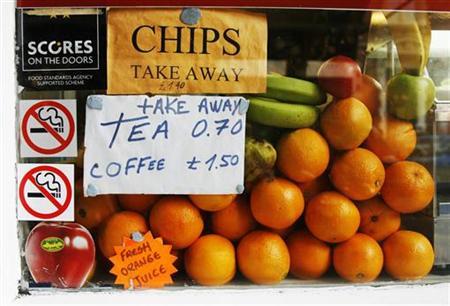Date: 11-Aug-09
Country: UK
Author: Peter Griffiths

Fruit is displayed in the window of a cafe, in London July 14, 2009.
Photo: Luke MacGregor
LONDON - Britain must find ways to grow more food while using less water, energy and fertilizers to help feed a growing world population and offset the effects of climate change on agriculture, the government said on Monday.
A senior minister said last year's sharp rise in the cost of food and oil and a severe drought in Australia showed the urgent need to develop a food security plan.
"Last year the world had a wake-up call with the sudden oil and food price rises," Environment Secretary Hilary Benn said in a statement to launch a national debate on food security. "We need a radical rethink of how we produce and consume our food.
Food and agriculture rose to the top of the political agenda at the G8 meeting in Italy in July. Leaders of the world's richest countries pledged $20 billion in farm aid to help poor countries feed themselves.
A sudden rise in the price of staple foods like rice, maize and wheat in the first half of 2008 triggered riots and hoarding in some parts of the world. Scientists say global warming could lead to devastating droughts and crop failures.
Farmers will have to adopt new methods to grow bigger crops while being more careful with increasingly valuable commodities such as water and fuel for machinery and fertilizers, Benn said.
"Globally we need to cut emissions and adapt to the changing climate that will alter what we can grow and where we can grow it," he said.
Global food production needs to rise by 70 percent by 2050 to meet the demands of a growing world population of 9 billion people, according to estimates from the United Nations' Food and Agriculture Organization.
Food production and consumption accounts for about 18 percent of Britain's greenhouse gas emissions, while generating 7 percent of its GDP on sales worth 172 billion pounds ($287 billion) in 2007.
Britain, which imports 37 percent of its food, must find ways of cutting the amount of food that is wasted and making the food and drink sector more sustainable, Benn said.
Environmental group Friends of the Earth said the government had failed to address the global impact of food production and consumption, overplayed the importance of genetically modified crops and failed to establish a supermarket watchdog.
Shadow Environment Secretary Nick Herbert accused the government of letting Britain become increasingly dependent on imports of foods which could be grown domestically.
The government's consultation on how the sector should look in 2030 will examine the whole supply chain, from farming and distribution to retail and disposal. The findings will be published later this year at www.defra.gov.uk/foodrin/security
(Editing by Andrew Roche)
© Thomson Reuters 2009 All rights reserved
